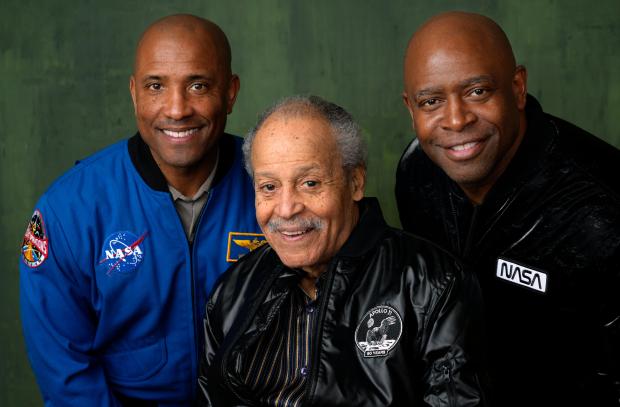One day in 1961, Ed Dwight’s high-flying life took an abrupt turn.
“I had a very successful military career … flying five different airplanes, which is a pilot’s dream,” he recalled.
Then he got word that he should prepare to become the first Black astronaut. He didn’t particularly want it, but his mother did; so did John Kennedy.
Dwiight’s story is at the core of “The Space Race” (shown here with Victor Glover, Dwight and Leland Melvin), an intriguing documentary about Blacks and NASA. It reaches Hulu and Disney+ on Tuesday (Feb. 13), after debuting at 9 p.m. Monday on the National Geographic Channel.
The film highlights Blacks who are now thriving at NASA, but the earlier story of Dwight — a lone figure, fighting hierarchy – stands out. “When I look at that film, I see the loneliness,” said Victor Glover, 47.
Glover has already piloted SpaceX and spent six months at the International Space Station; next year, he’s slated to pilot a moon mission. He has one key avantage: “I am not alone; I have all these other people.”
Dwight, now 90, felt alone, with officers insisting he shouldn’t be in astronaut training. “There were 17 people in my class and I finished seventh. So I beat 10 white guys.”
And he confronted the ultimate white guy.
Chuck Yeager was a fighter ace in three wars and led NASA’s pilot-training. He was dead-set against the new recruit, Dwight said. In private, they went eye-to-eye,
“I took my insignia off and threw it on the floor. I said, ‘Can I talk now?’ Then I gave him all kinds of” grief.
Well, it was sort of eye-to-eye. Dwight, 5-foot-5, wasn’t what people expected. “They expected a 6-foot-tall, black-skinned (guy). They got me, just a little-bitty guy.”
He had grown up iin Kansas City, Mo., where his dad played for the Monarchs in baseball’s Negro League. He went to Catholic schools, graduated from community college, joined the Air Force and was doing fine as a pilot. That’s when Kennedy insisted NASA prepare for the first Black astronaut.
Dwight said he hesitated. “My mom got involved and said I’ve got to do it.”
Yeager, however, resented having this new guy forced upon him. Instructors, Dwight said, ignored him. “I learned more from my fellow students.”
After Kennedy’s death, Dwight was passed over for the astronaut corps; he left the Air Force in 1966 and eventually found a long career as a sculptor.
Along the way, he found holes in his knowledge. When asked to create one memorial, he admitted he had never heard of Harriet Tubman.
The next generations knew about the underground-railroad hero – but had other gaps. “I learned about Harriet Tubman – but didn’t learn about Ed Dwight,” Leland Melvin said.
Nor did others; that was obvious when Melvin, 59, retired from NASA. “Ed came to my retirement party and he had to tell everyone who he was.”
(Quotes here are from a Television Critics Association press conference and a separate interview.)
The space program is no longer all-white, Melvin, a “Space Race” producer said. Vanessa Wyche heads the Johnson Space Center, Joe Acaba (who is Puerto Rican) heads the astronaut corps, Charlie Bolden now retired, was the NASA administrator.
During a key racial moment – the trial of Derek Chauvin, in the George Floyd case – Glover was orbiting in space. Other Black astronauts combined for a virtual gathering.
“We just came together,” he said, “and we continue to.” Unlike Ed Dwight long ago, he didn’t feel alone.

Equality in space? It faced some hurdles
One day in 1961, Ed Dwight’s high-flying life took an abrupt turn.
“I had a very successful military career … flying five different airplanes, which is a pilot’s dream,” he recalled.
Then he got word that he should prepare to become the first Black astronaut. He didn’t particularly want it, but his mother did; so did John Kennedy.
Dwiight’s story is at the core of “The Space Race” (shown here with Victor Glover, Dwight and Leland Melvin), an intriguing documentary about Blacks and NASA. It reaches Hulu and Disney+ on Tuesday (Feb. 13), after debuting at 9 p.m. Monday on the National Geographic Channel. Read more…